PRINCETON, NJ -- Most Americans are unsure of whether Barack Obama and John McCain are relying on the public financing system to fund their presidential campaigns. But the minority of Americans who say they do know are generally correct in saying McCain has agreed to take public financing while Obama has decided not to.
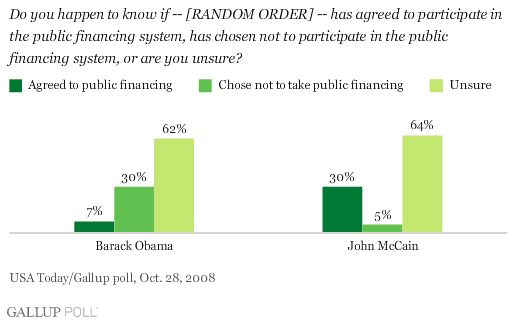
When informed of the candidates' decisions on public financing, the vast majority say this does not affect their opinion of the candidates. To the extent Americans see the decisions as consequential, they take a more positive view of McCain's decision (15% say it makes them feel more favorably toward him versus 6% who say less favorably) than of Obama's (8% say it makes them feel more favorably toward him and 18% less favorably).
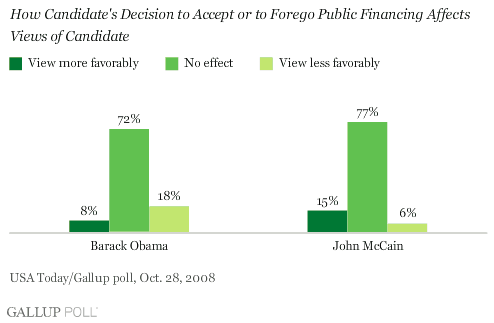
The Oct. 28 poll was conducted in the midst of a presidential campaign in which the candidates have spent more money than in any previous campaign, and in which Obama has set new standards for fund raising. He decided to opt out of the public financing system largely because of his ability to raise money well beyond the federal spending limit of $84 million. He used a portion of his large war chest to buy airtime on several major television networks Wednesday night to show a 30-minute campaign advertisement.
McCain -- one of the leading Senate voices on campaign finance reform -- agreed to the spending limit, though it is unclear whether he would have made the same decision had he been able to raise the same large sums of money as Obama.
Americans generally agree that spending on the presidential campaigns has exceeded their sense of what is appropriate, as 70% say too much money has been spent on presidential campaigns in this year's election. That includes 84% of McCain supporters but also a majority (58%) of Obama supporters.
Views of Spending Limits
Generally speaking, Americans support campaign spending limits. The poll finds 57% saying there should be limits on what presidential candidates can spend, while 38% say candidates should be able to spend whatever money they can raise.
Americans also seem to back the current public financing system that includes spending limits -- only 19% believe the current system should be eliminated. Americans, however, stop short of saying candidates should be required to take public financing -- only 32% hold this view. The plurality of 40% think the system should be optional, as it is now. When this group was asked whether the rules should be changed so that candidates would be more likely to take public financing, most said the rules should be kept the same as they are now.
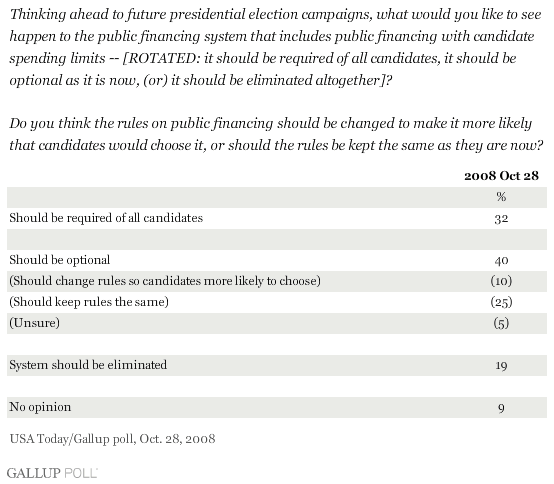
Partisans' views on the desirability of campaign limits may be influenced more by the current election campaign situation than by what their respective parties' positions on campaign finance have been historically. Democrats -- whose party has generally supported spending limits -- oppose them by 54% to 42% in the current poll. Republicans -- whose party has generally opposed spending limits -- favor them by 64% to 33%.
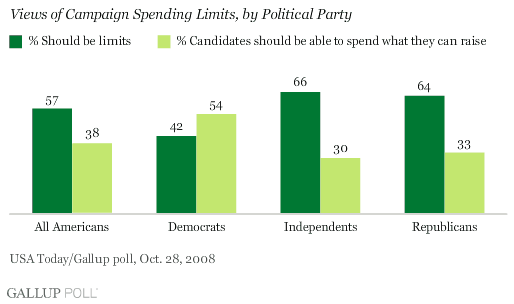
Forty-two percent of Republicans say all candidates should be required to participate in the public financing system -- more than say it should be optional (33%). A slim majority of Democrats say the system should be optional, with equal percentages saying it should be required or should not exist.
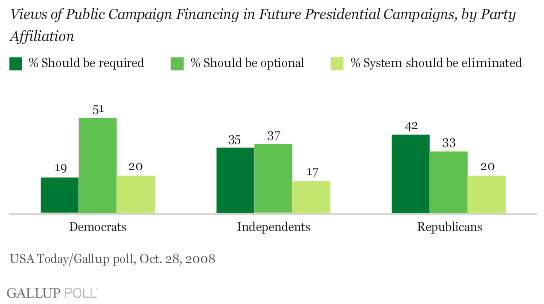
Implications
While Americans generally support limits on spending, it appears as though they are not closely tuned in to how the candidates are funding their campaigns. The new polling suggests that even if they were aware, it would not make a material difference to the way most voters view the candidates.
Survey Methods
Results are based on telephone interviews with 1,010 national adults, aged 18 and older, conducted Oct. 28, 2008. For results based on the total sample of national adults, one can say with 95% confidence that the maximum margin of sampling error is ±3 percentage points.
Interviews are conducted with respondents on land-line telephones (for respondents with a land-line telephone) and cellular phones (for respondents who are cell-phone only).
In addition to sampling error, question wording and practical difficulties in conducting surveys can introduce error or bias into the findings of public opinion polls.
Polls conducted entirely in one day, such as this one, are subject to additional error or bias not found in polls conducted over several days.
